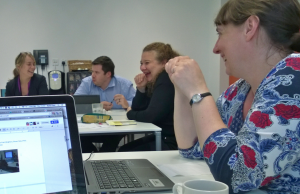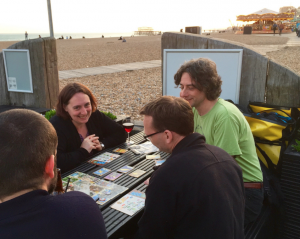Why Playful Learning?
- Safe Failure Play enables the creation of safe learning communities and activities in which learners can take risks, fail, learn from that failure, and build resilience.
- Explore Possibilities Play supports creativity by enabling learners to inhabit other spaces, use their imaginations and explore new possibilities, identities and ways of being in the world.
- Collaborative Ideas Play breaks down barriers, it gets learners to collaborate and work together and this helps productivity and creativity.
- Empowerment Play gives learners agency to test, and decide, on their own direction and approach to learning.
- Memorable Learning Playful approaches can make content more ‘sticky’ and easier to remember. This leads to an improved student experience by enacting innovative and active pedagogies.
The ALT Playful Learning SIG (PLSIG) was established in October 2010 as the Games and Learning SIG and we changed our name in September 2016 to highlight our shift in thinking from games to play.The group is interested in the design, use and evaluation of games in practice, and the academic study of play and player communities and their potential contributions to learning. We also hope to provide opportunities for members to experiment with play-based techniques as part of the SIG activity.

The group meets online six times a year, and face-to-face twice. We are also involved in ongoing writing, development and research projects.
[get a flavour of what we do with this blog post from the Manchester 2014 face-to-face meet]
Aims
The aims of the Special Interest Group in Playful Learning are:
- To share research evidence and experiential practice in the area of play, games and learning.
- To provide a forum for discussion and collaboration to support the development of outputs such as journal articles, practitioner guidance, seminars, and research proposals.
- To create a supportive community for new practitioners and researchers in the field as well as those who are more established.

Scope
The primary areas of interest of the Special Interest Group are:
- The use of all types of games, digital and traditional, online and real world.
- The practice, as well as the theory, of play and learning.
- The use of playful appraoches with adults, in formal and informal contexts.

Joining the SIG
The ALT Playful Learning Special Interest Group is open to anyone who shares our aims and areas of interest. We do ask, however, that you are a member of the Association for Learning Technology (Individual Membership is £54 p.a., Associate Membership is free if you are a staff member at an Organisational or Sponsoring Member).
You can join ALT here.
For further information, or if you have any questions, please contact Nicola Whitton or Alex Moseley.

![[Playful Learning]](http://altc.alt.ac.uk/plsig/wp-content/uploads/sites/1125/2016/10/plsig-logo.jpg)